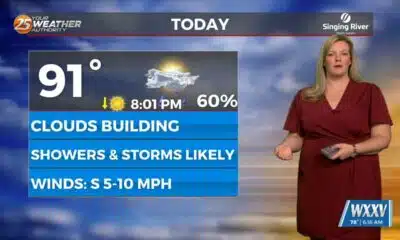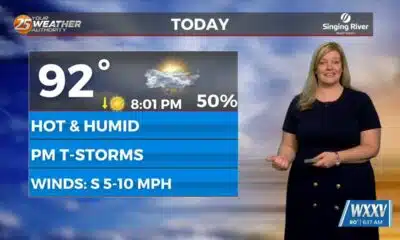Local News
Sending taxpayer money to private schools advances in Mississippi House
SUMMARY: A House committee advanced a bill that enables taxpayer money to flow from public schools to private institutions, sparking concerns from Democrats about the potential impact on underprivileged students. House Education Chairman Rob Roberson emphasized the need for discussions on educational solutions for disadvantaged areas. The bill allows students from low-rated districts to use state funds for private school tuition if no higher-rated districts are available within 30 miles. Critics warn it could exacerbate educational inequality and challenge the constitutionality of using public funds for private education. The proposal now heads to the House floor for a vote amidst widespread opposition.
The post Sending taxpayer money to private schools advances in Mississippi House appeared first on www.wxxv25.com
Local News
Small businesses feeling impacts of increased traffic caused by Buc-ee’s
SUMMARY: One month after Buc-ee’s opened in South Mississippi, its food and merchandise are popular, but traffic around its single-entrance roundabout is causing issues. Michelle Englett, local business owner, says the roundabout creates heavy congestion, confusing drivers and blocking access to nearby shops. The design directs customers straight to Buc-ee’s, reducing traffic for other businesses. While some visitors find it easy to navigate, they rarely explore beyond Buc-ee’s. Workers at nearby stores suggest solutions, such as additional entrances, employee parking, or a service road to better manage traffic flow and support local commerce.
The post Small businesses feeling impacts of increased traffic caused by Buc-ee’s appeared first on www.wxxv25.com
Local News
Old School Tutoring and Toys offering unique school supplies service
SUMMARY: As summer ends, back-to-school shopping can be stressful for parents like Jeryn Frederic, who has five children. Old School Tutoring and Toys in Pascagoula offers a customizable, affordable school supply bag service that delivers directly to local schools, saving parents time and hassle. Since 2017, owner Christina Bates has grown the service from 50 to over 500 bags annually, with plans to expand. Profits support local schools, donating \$10 per bag purchased to partner schools. The company also offers donation “essential boxes” to help families in need, making back-to-school prep easier for the community.
The post Old School Tutoring and Toys offering unique school supplies service appeared first on www.wxxv25.com
Local News
“Gulfport Rising” vision introduced to Gulfport School District which includes plan for on-site Football Field!
SUMMARY: Gulfport School District’s Athletic Director Matt Walters unveiled “Gulfport Rising,” a multi-phase vision to enhance the school and community. The plan includes building a high school football stadium on campus—long overdue—along with a natatorium, bowling lanes, pickleball courts, and a powerlifting facility to serve diverse student interests. Head Football Coach Blake Pennock emphasized the project’s significance, highlighting opportunities for athletes, band members, and community events. Both praised the collaboration between the district and city, noting the project’s transition from planning to action. WXXV News 25 will continue covering the developments, marking an exciting future for Gulfport schools.
The post “Gulfport Rising” vision introduced to Gulfport School District which includes plan for on-site Football Field! appeared first on www.wxxv25.com
-
News from the South - Arkansas News Feed6 days ago
Real-life Uncle Sam's descendants live in Arkansas
-
News from the South - Georgia News Feed5 days ago
'Big Beautiful Bill' already felt at Georgia state parks | FOX 5 News
-
News from the South - Oklahoma News Feed6 days ago
LOFT report uncovers what led to multi-million dollar budget shortfall
-
News from the South - Alabama News Feed7 days ago
Alabama schools to lose $68 million in federal grants under Trump freeze
-
News from the South - Missouri News Feed7 days ago
Celebrate St. Louis returns with new Superman-themed drone show
-
Local News6 days ago
Maroon Tide football duo commits to two different SEC Teams!
-
News from the South - North Carolina News Feed5 days ago
Raleigh caps Independence Day with fireworks show outside Lenovo Center
-
News from the South - Tennessee News Feed6 days ago
Officers run for cover after man in car fired shots at them in Downtown Memphis



















































